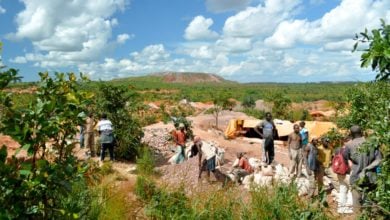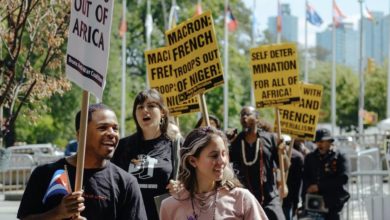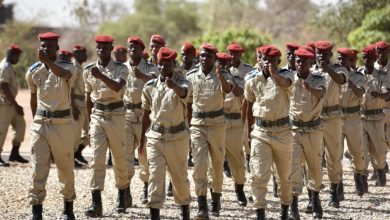On Jan. 9 and 10, the people of
Sudan voted on a referendum to divide their country. At the time of
publication, no official decision on the referendum was announced though a vote
for the partition of the country is likely.
The referendum is a result of
the 2005 Naivasha agreement, which ended the 22-year-long civil war in Sudan.
The peace agreement was brokered between forces responsible for the unrest in
the South, the Sudanese People’s Liberation Movement, and the central
government of Sudan.
The SPLM has been warring for
secession, a demand made popular due to underdevelopment and
underrepresentation in the South. In spite of its radical sounding name, the
SPLM is far from being a revolutionary force and has benefited greatly from the
backing of Western imperialism throughout its struggle. The new state would
certainly become an ally of the imperialists in the region.
Due to years of foreign
pressure, demonization, charges of war crimes and sanctions, President Omar
al-Bashir has no choice but to issupport calls for secession. “I personally will
be sad if Sudan splits, but at the same time I will be happy if we have peace
in Sudan between the two sides,. he said. “We cannot deny the desire and the
choice of the people of the south.”
However, secession will
directly impact the economic vitality of northern Sudan. The majority, 80
percent, of the country’s immense oil resources are located in the South and under
the control of the SPLM.
This referendum may directly
impede the ability of the Sudanese people to maintain full control over their
country and its sovereignty and natural resources. Secession will likely weaken
the independence of the people of Sudan, result in two weak states and make it
easier for imperialism to dictate its will to both governments, certainly the
southern part.
The breakup of the country
would not be evidence of the irreconcilable ethnic divisions among Sudanese
people. It would, however, signal the continued attempt by U.S. imperialism to
dominate the region for economic and political gain.
Colonialism sows the seeds of conflict
The roots of the current
conflict, including Darfur, should be traced to the legacy of brutal, racist,
capitalist colonialism in Africa. The British are responsible for the false
racial distinction between “Arab” and “African” Sudanese, which is touted in
the media today.
Sudan has always been a
multi-ethnic/multi-national country. Amongst the Sudanese people, there is no
divide in Darfur or elsewhere between “Arabs” and
“Africans.” All Sudanese are African. These ethnic or national
divisions are used as a cover for the conflict over allocation of natural
resources and formal representation in the political structure. Primarily, the
roots of any distinction between the groups are economic, not physical or
cultural.
In the mid-1980s, the Sudanese government provided arms to some of the herder tribes. This is the base of the so-called Janjaweed—literally, “armed horsemen.” The SPLA launched an uprising against the central government in 1983 that became mired in regional and international political struggles. The civil war lasted over 20 years and is related to the present Darfur conflict.
The current governments of
Sudan and Chad have serious inter-regional conflicts, many stemming from the
issue of resource allocation created by the imperialists. The government of
Chad, which is under French economic domination, funded groups like the Justice
and Equality Movement, which has now splintered. The Sudanese government
supported the notorious Janjaweed. The bloodshed was a result of the
exacerbation of the traditional conflicts in the area with backing from various
governments.
Today this struggle continues
as an otherwise peaceful referendum process sparked uprisings in the region of
Abyei, which is on the unofficial border of north and south Sudan, prior to the
vote. Even after the referendum, struggles over control of natural resources
and the involvement of U.S. imperialism will only heighten tensions in the
region.
Dismantling Sudan
The aim of the United States
has been “regime change” in Sudan since the early 1990s, if not before. Washington
is also hostile to a united Sudan because of the nationalist character of the
Bashir government. The Sudanese government refused to support the U.S. wars
against Iraq in 1991 and 2003.
Bashir recently stated in an
interview with Der Spiegel, “We support Hamas’ and Hezbollah’s legitimate
struggle against the Israeli occupation and the resistance against the American
invaders in Iraq and Afghanistan.” In fact many pro-Israel, Zionist U.S. groups
formed the backbone of the “Save Darfur” movement.
Perhaps most to the displeasure
of the United States are the close ties Khartoum is developing with China. Over
half of Sudan’s exports go to China. One-fifth of Sudan’s imports come from
China, making it by far Sudan’s largest trading partner. In Sudan’s growing oil
industry, China is the largest investor, with the China National Petroleum
Corporation helping to build refineries and pipelines.
The prospect of a rival world
power like China having such influence in a country with major oil supplies in
Africa flies in the face of the U.S. goal of outright control of the world’s
major oil reserves. These geopolitical motivations drive U.S. foreign policy
far more than the crocodile tears over the killing of Africans.
The referendum represents the
manipulation by the imperialist powers of the real desire of the people of the
Southern Sudan for self-determination and representation in the political
process. This referendum, portrayed in the corporate media as an attempt to
assist the people of Sudan, is designed to assist U.S. imperialism’s plans for
economic domination by breaking up the country into smaller states that can be
more easily controlled.
We support the Sudanese people
and defend their right to determine their own destiny free of imperialist
interference.




